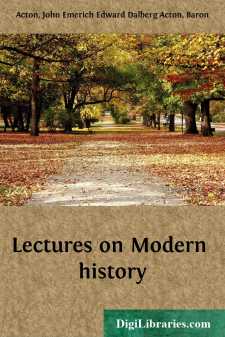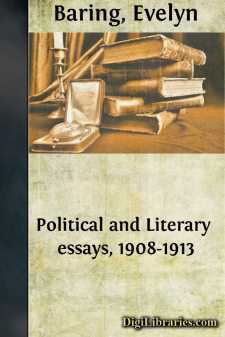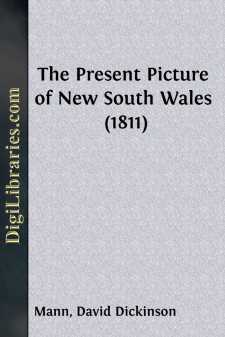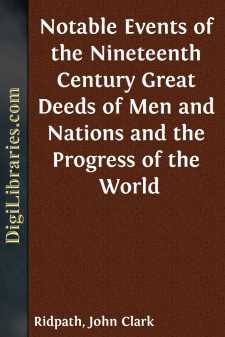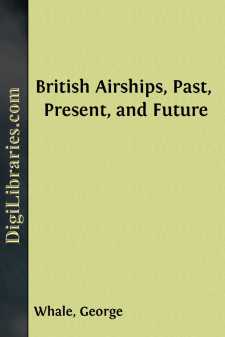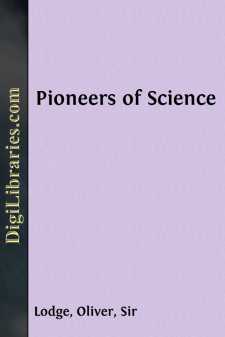History
- Africa 30
- Americas (North Central South West Indies) 50
- Ancient 68
- Asia 58
- Australia & New Zealand 8
- Canada 41
- Caribbean & West Indies 1
- Civilization 20
- Eastern Europe 12
- Europe 310
- Expeditions & Discoveries 60
- General
- Historical Geography 1
- Jewish 9
- Latin America 3
- Medieval 8
- Middle East 13
- Military 248
- Revolutionary 8
- Study & Teaching 5
- United States 353
- Western Europe 56
- World 13
General Books
Sort by:
INAUGURAL LECTURE ON THE STUDY OF HISTORY Delivered at Cambridge, June 1895 FELLOW STUDENTS—I look back today to a time before the middle of the century, when I was reading at Edinburgh and fervently wishing to come to this University. At three colleges I applied for admission, and, as things then were, I was refused by all. Here, from the first, I vainly fixed my hopes, and here, in a happier hour,...
more...
by:
Evelyn Baring
I THE GOVERNMENT OF SUBJECT RACES "The Edinburgh Review," January 1908 The "courtly Claudian," as Mr. Hodgkin, in his admirable and instructive work, calls the poet of the Roman decadence, concluded some lines which have often been quoted as applicable to the British Empire, with the dogmatic assertion that no limit could be assigned to the duration of Roman sway. Nec terminus unquam...
more...
by:
Ellice Hopkins
CHAPTER I In a banquet given in honor of Heinrik Ibsen by a Norwegian society known as the Woman's League, in response to a speech thanking him in the name of the society for all he had done for the cause of women, the poet, while disclaiming the honor of having consciously worked for the woman's cause—indeed, not even being quite clear as to what the woman's cause really was, since in...
more...
Chapter I.Discovery of New South Wales.--Arrival of a Colony there from England.-- Obstructions calculated to retard the Progress of the Settlement.-- Departure of Governor Phillip.--Intervening Governors, until the Arrival of John Hunter, Esq. and his Assumption of the Government.-- Printing Press set up.--Cattle lost, and Discovery of their Progeny in a wild State.--Playhouse opened.--Houses...
more...
BRUMAIRE. THE OVERTHROW OF THE FRENCH DIRECTORY. The eighteenth century went out with the French Directory, and the nineteenth came in with the Consulate. The coincidence of dates is not exact by a year and a month and twenty-one days. But history does not pay much attention to almanacs. In general our century arose with the French Consulate. The Consulate was the most conspicuous political fact of...
more...
I. THE PERIOD OF LEGEND The blending of fact and fancy which men call legend reached its fullest and richest expression in the golden age of Greece, and thus it is to Greek mythology that one must turn for the best form of any legend which foreshadows history. Yet the prevalence of legends regarding flight, existing in the records of practically every race, shows that this form of transit was a dream...
more...
by:
Harriett Bradley
INTRODUCTION The enclosure movement—the process by which the common-field system was broken down and replaced by a system of unrestricted private use—involved economic and social changes which make it one of the important subjects in English economic history. When it began, the arable fields of a community lay divided in a multitude of strips separated from each other only by borders of unplowed...
more...
by:
George Whale
INTRODUCTION Lighter-than-air craft consist of three distinct types: Airships, which are by far the most important, Free Balloons, and Kite Balloons, which are attached to the ground or to a ship by a cable. They derive their appellation from the fact that when charged with hydrogen, or some other form of gas, they are lighter than the air which they displace. Of these three types the free balloon is...
more...
CHAPTER I THE EXPLANATION OF MATERIAL CHANGES GIVEN BY THE GREEK THINKERS. For thousands of years before men had any accurate and exact knowledge of the changes of material things, they had thought about these changes, regarded them as revelations of spiritual truths, built on them theories of things in heaven and earth (and a good many things in neither), and used them in manufactures, arts, and...
more...
by:
Oliver Lodge
LECTURE I COPERNICUS AND THE MOTION OF THE EARTH The ordinary run of men live among phenomena of which they know nothing and care less. They see bodies fall to the earth, they hear sounds, they kindle fires, they see the heavens roll above them, but of the causes and inner working of the whole they are ignorant, and with their ignorance they are content. "Understand the structure of a...
more...


